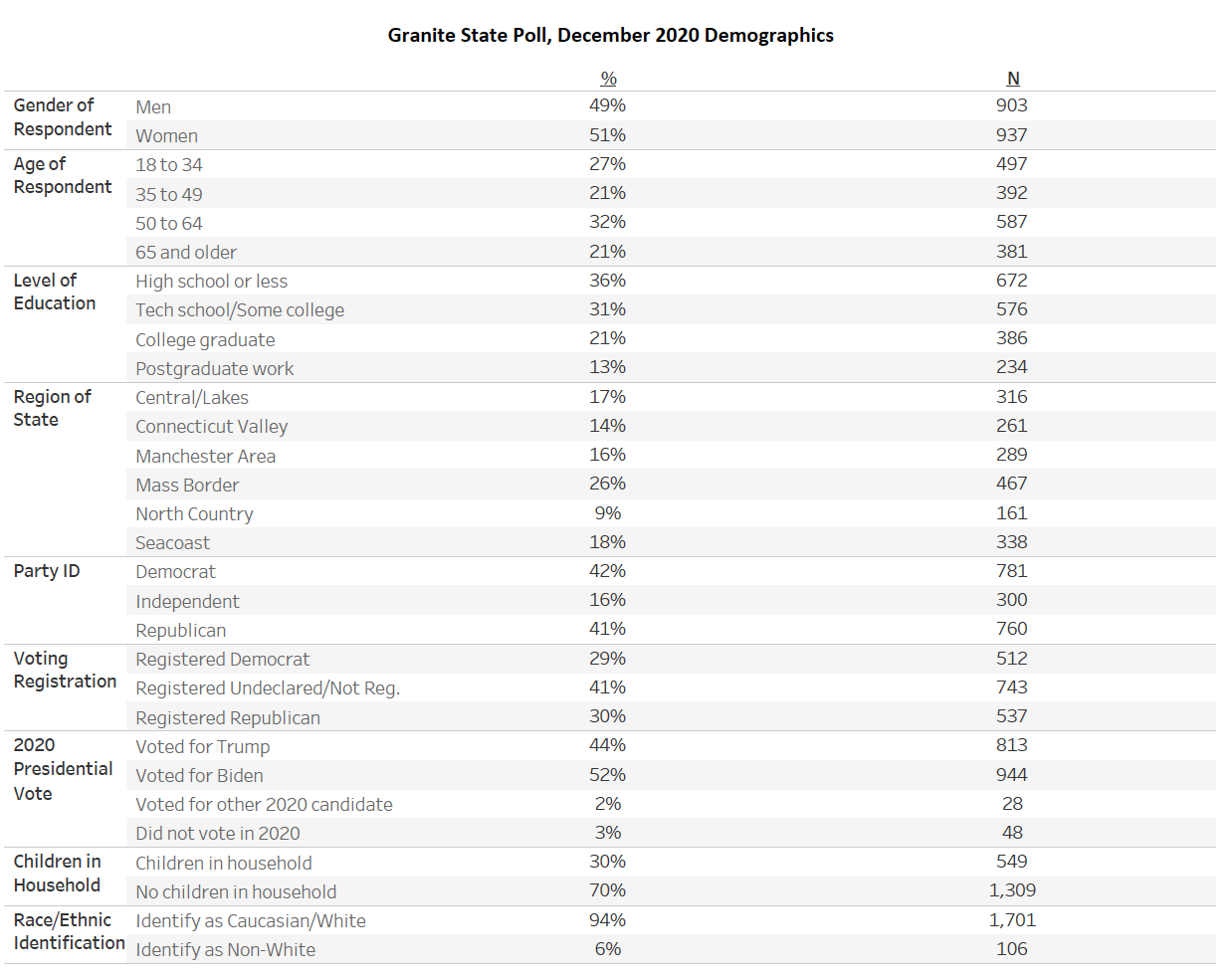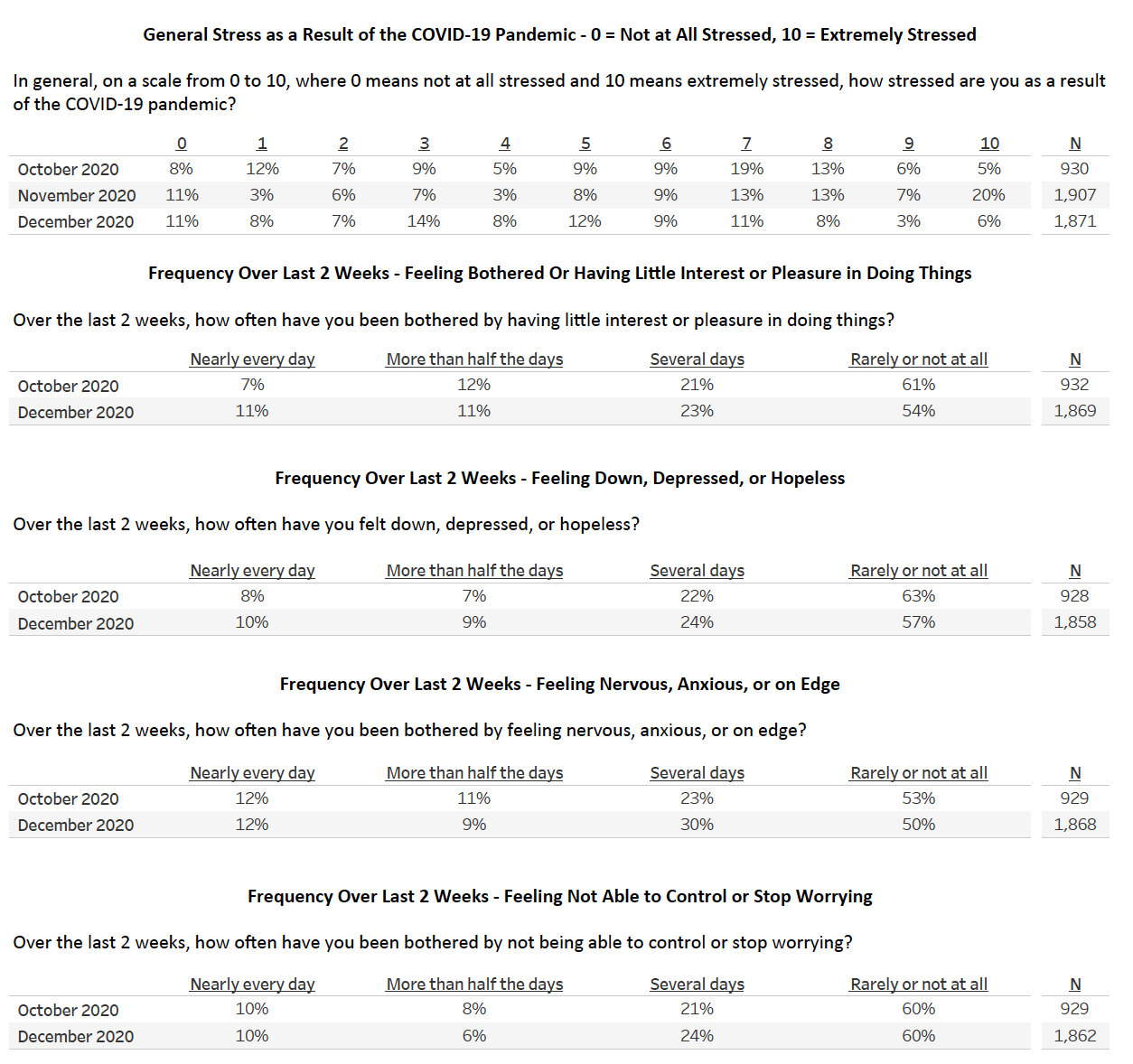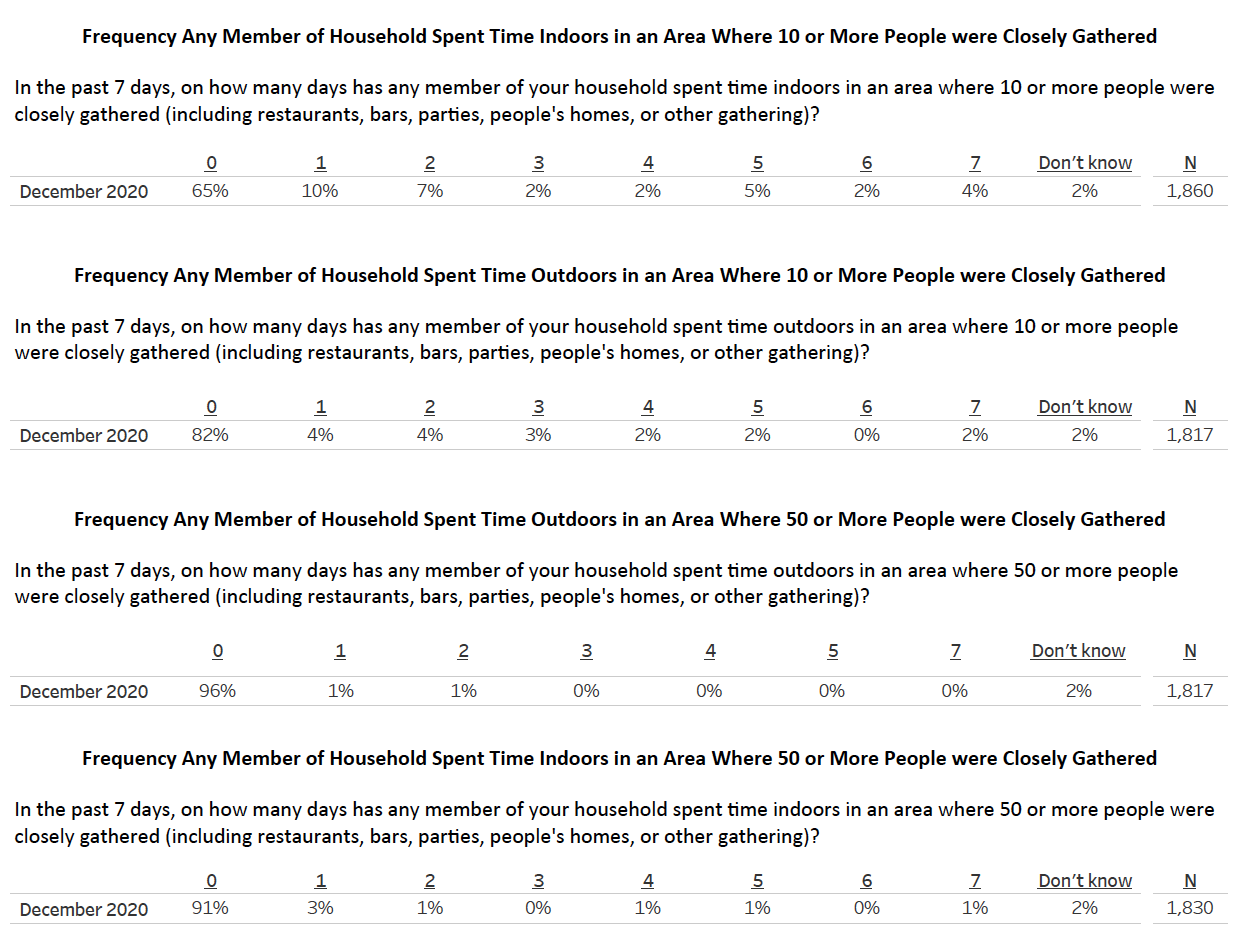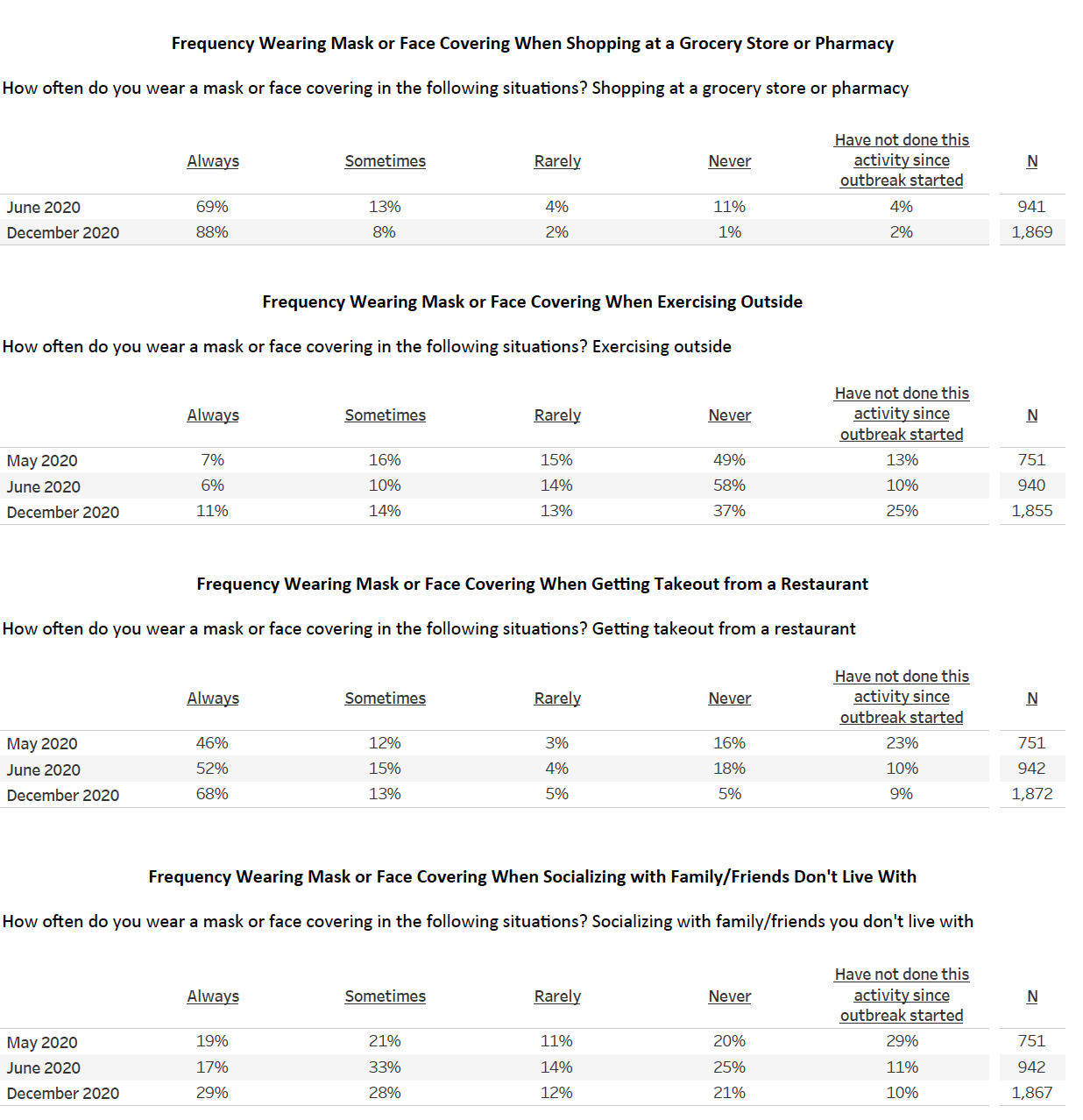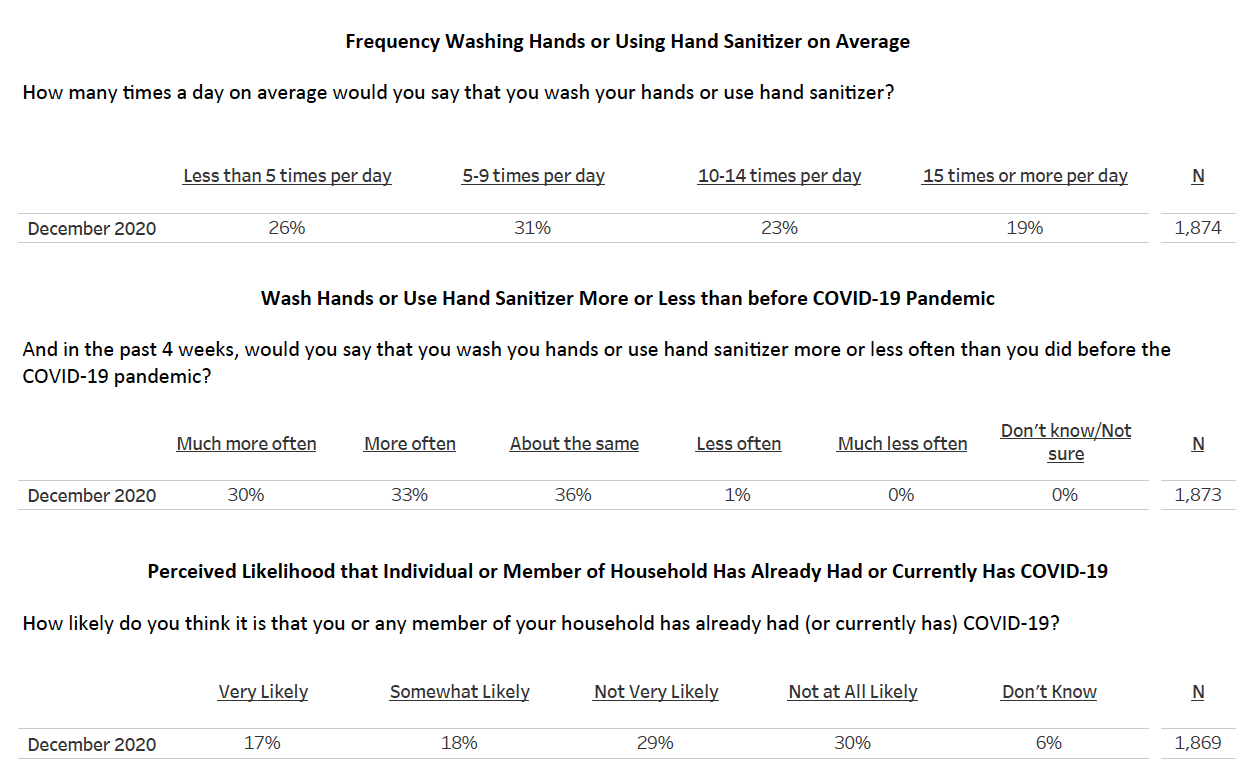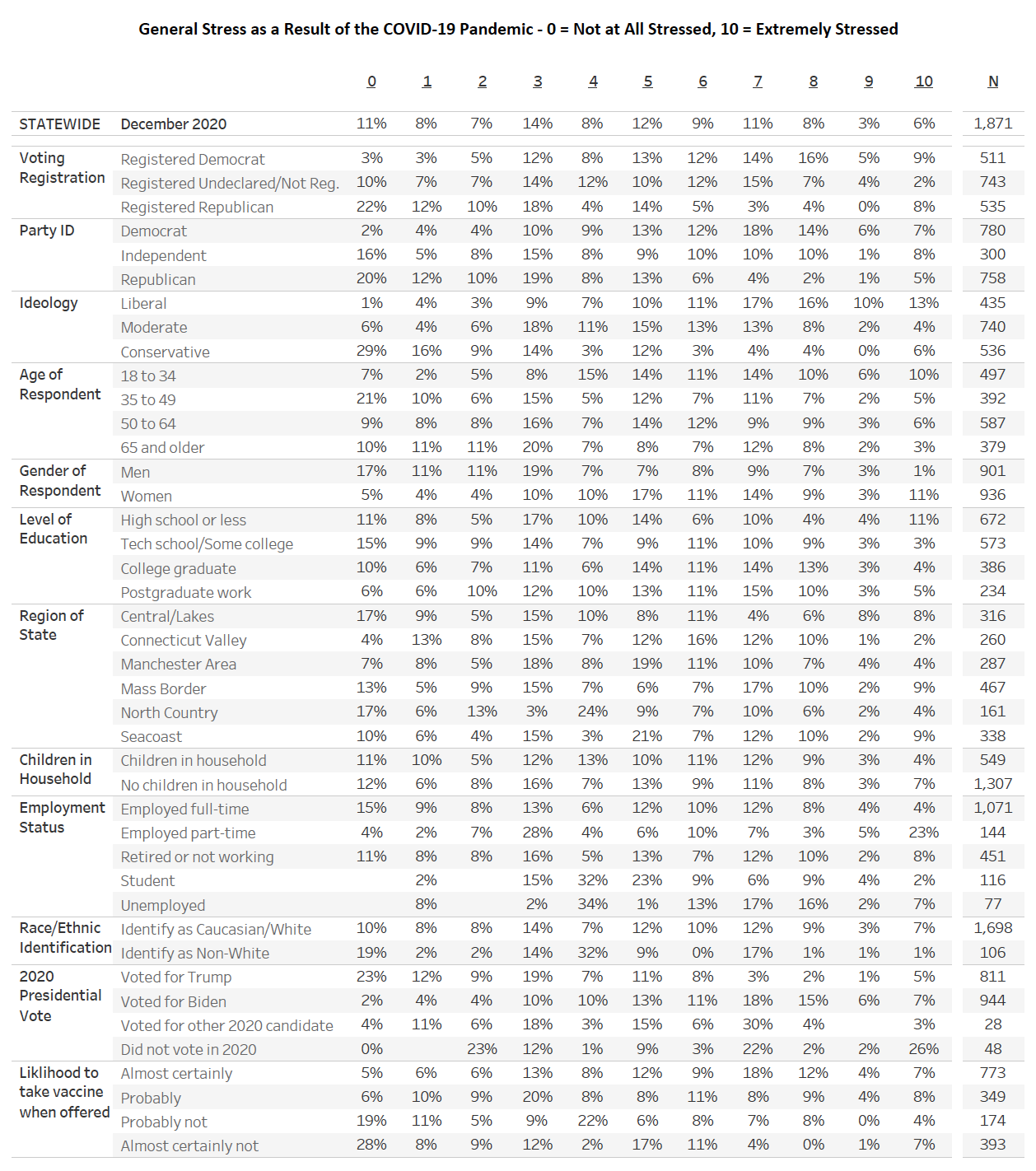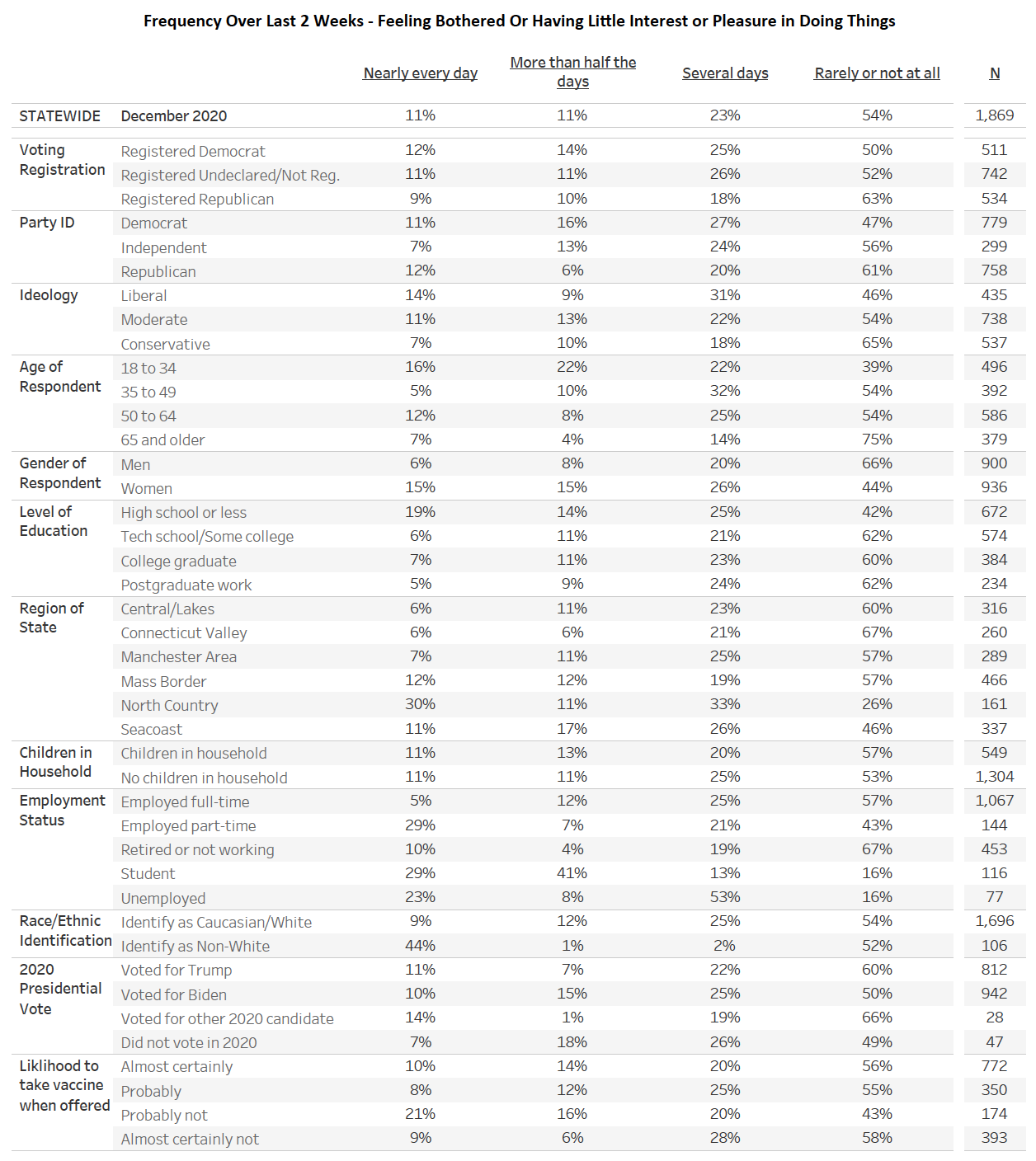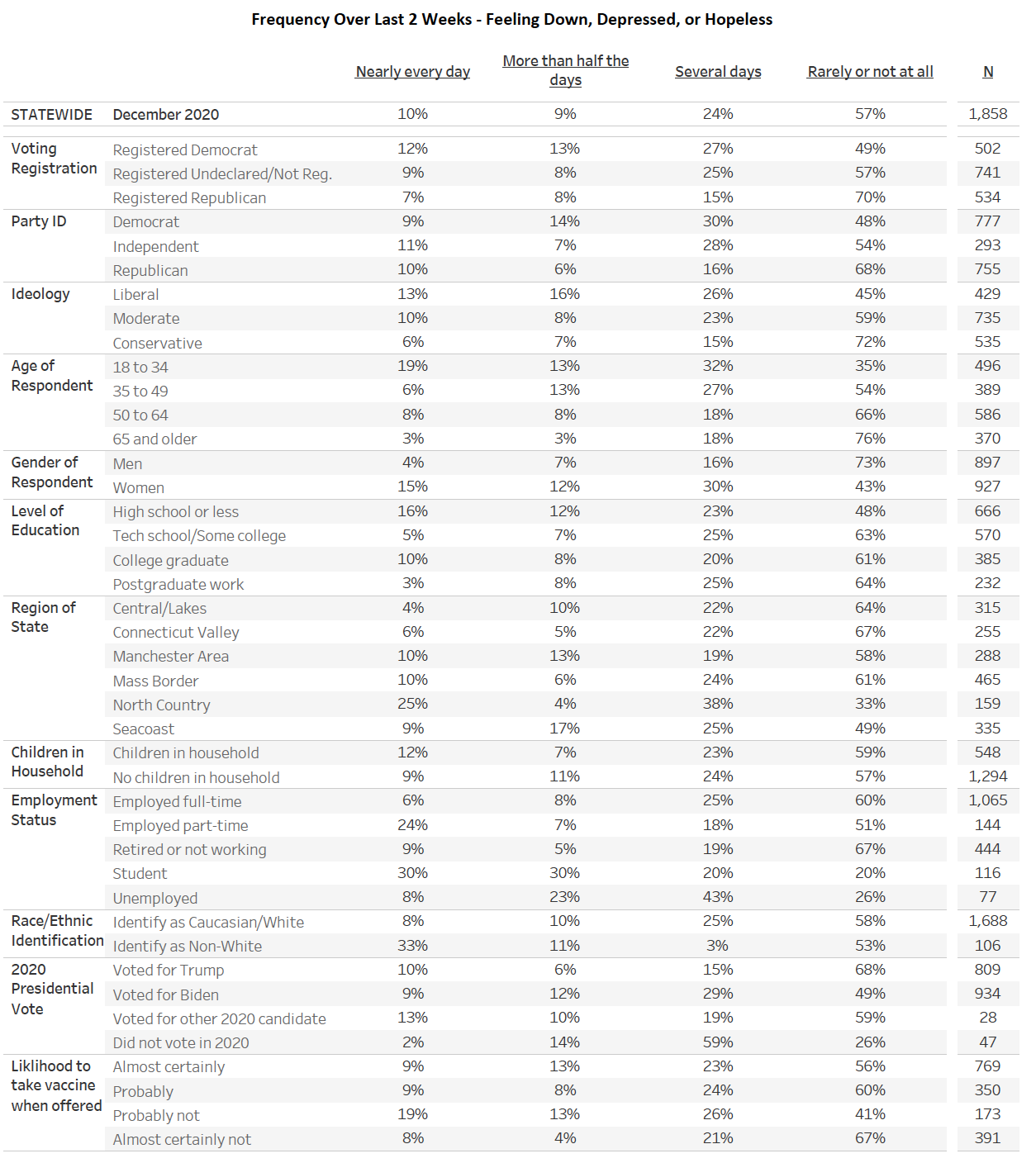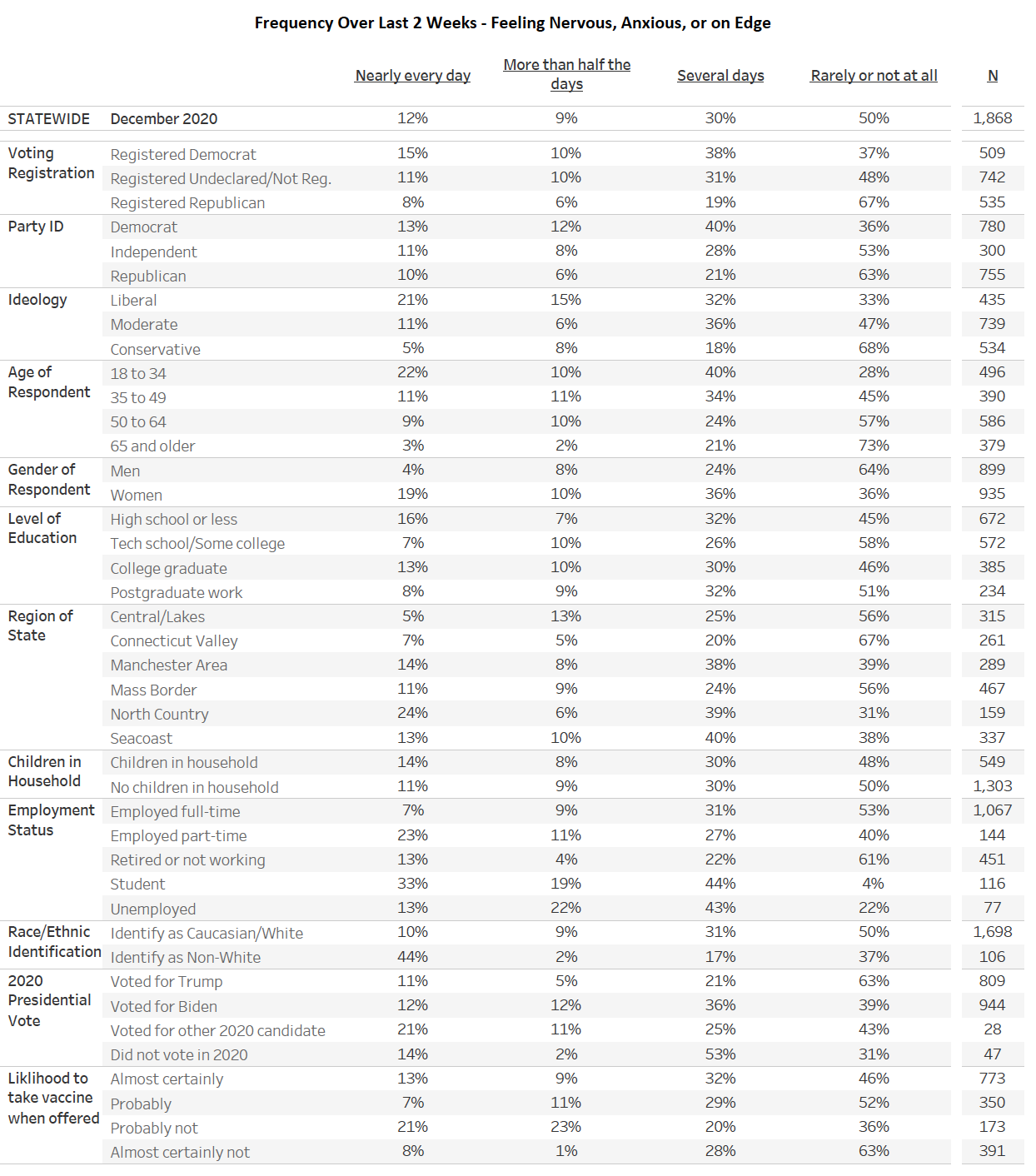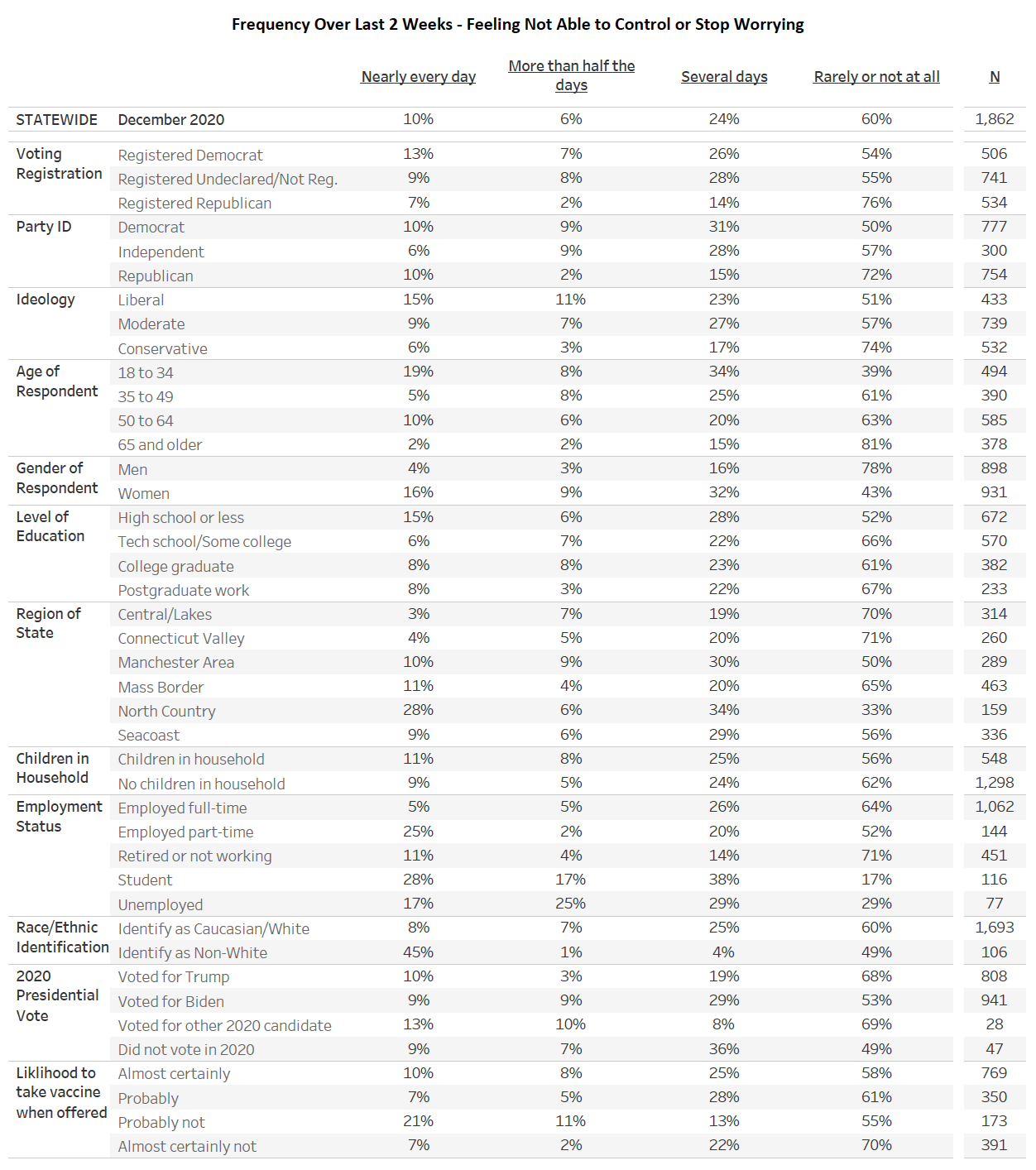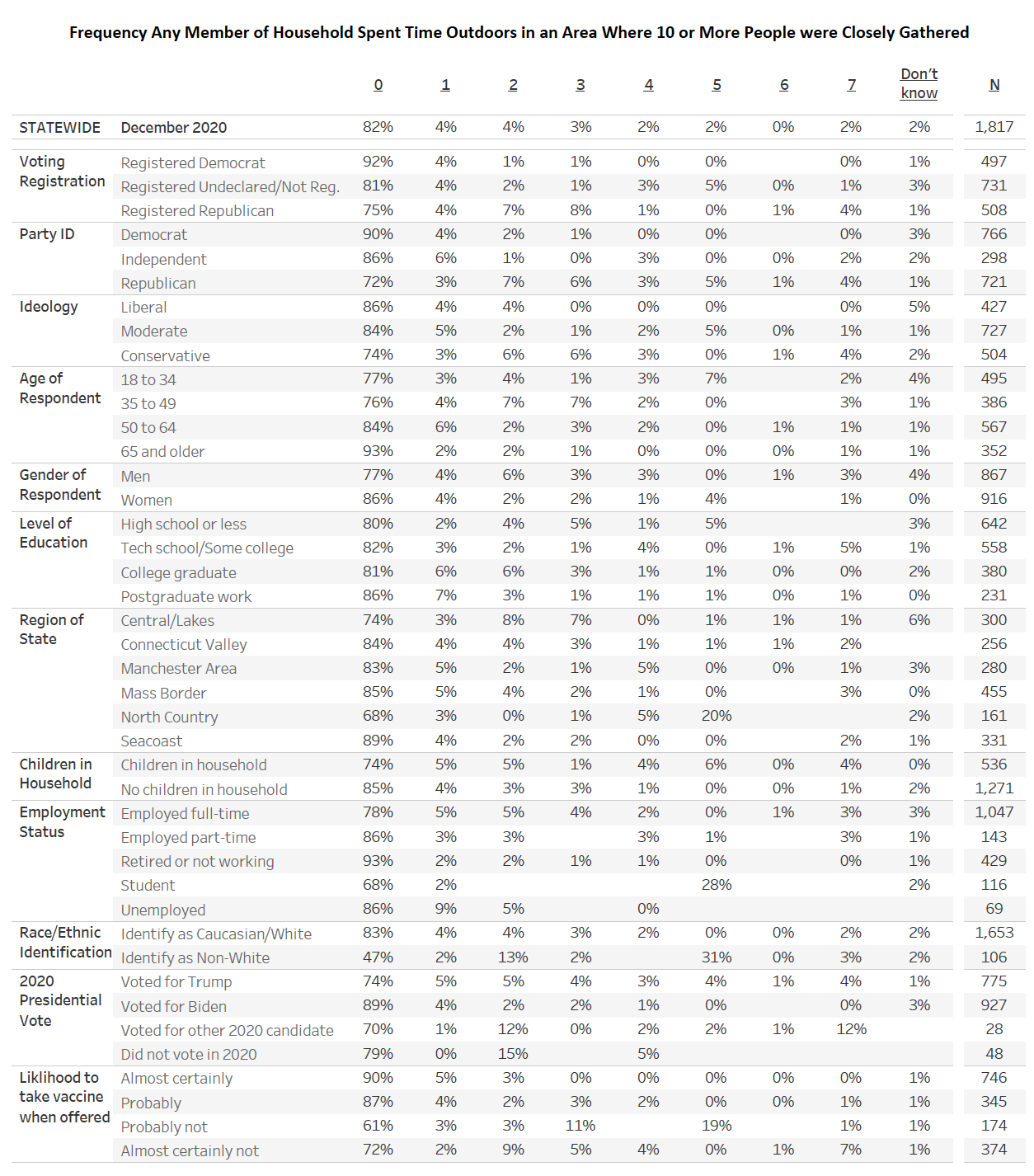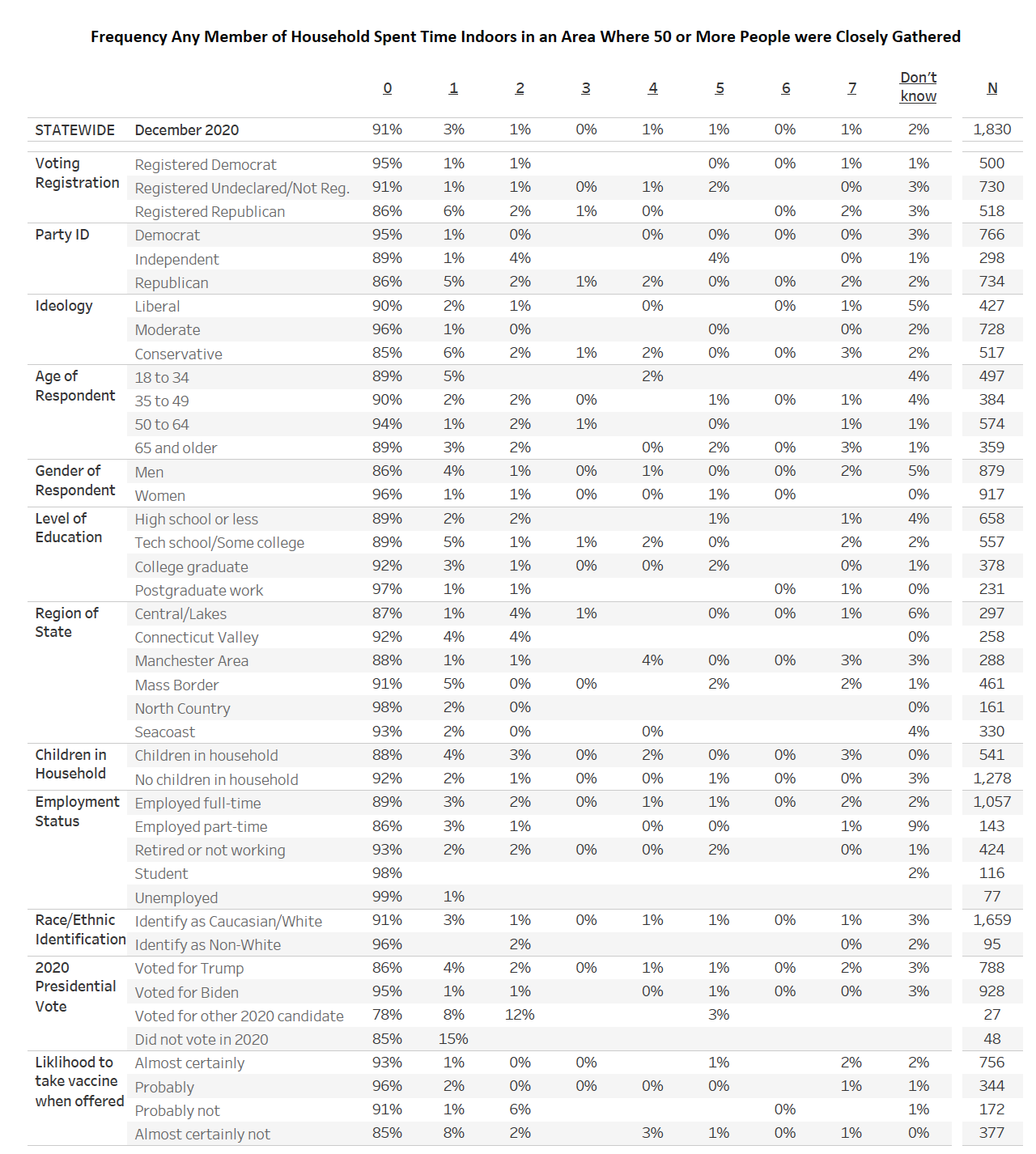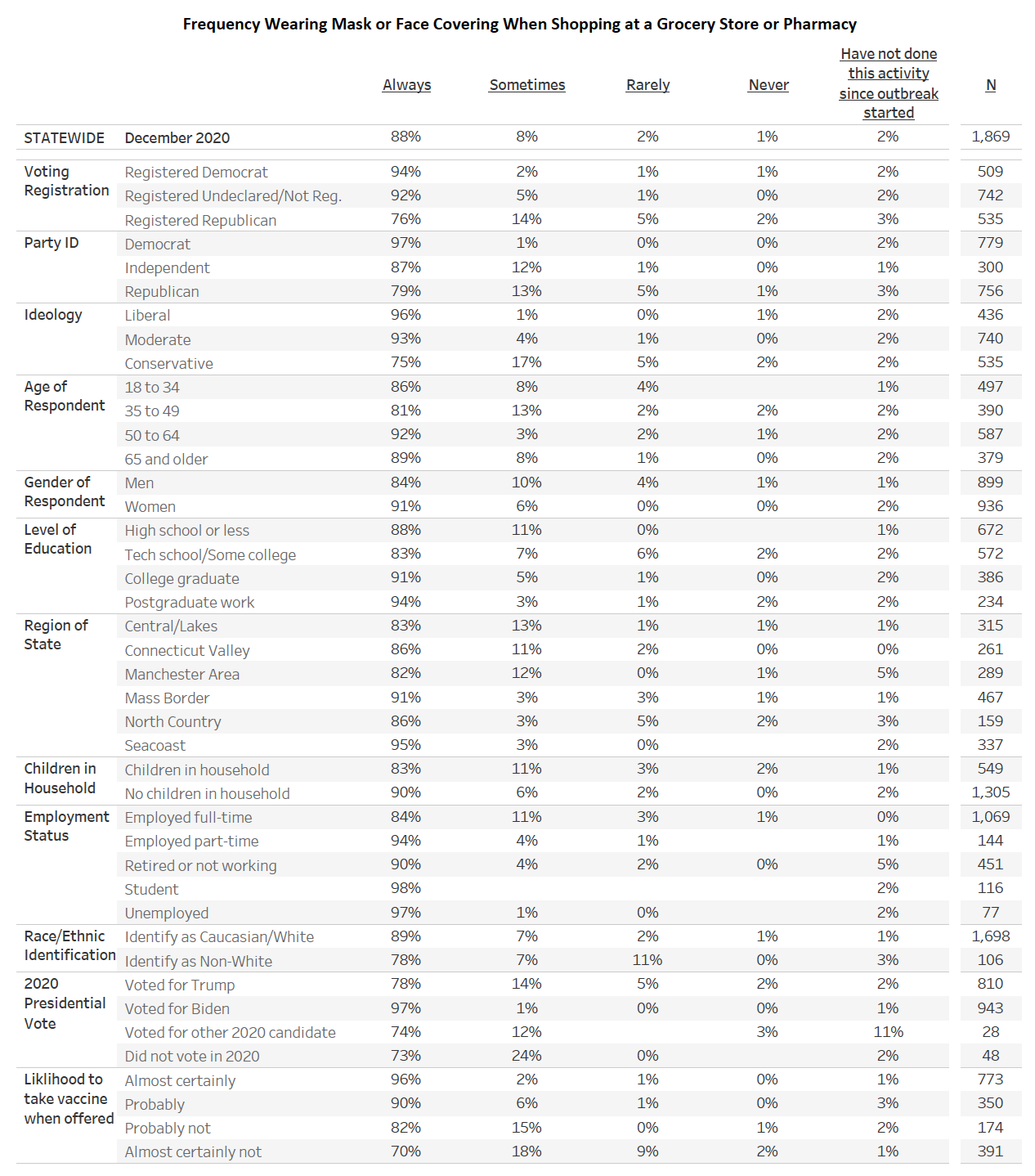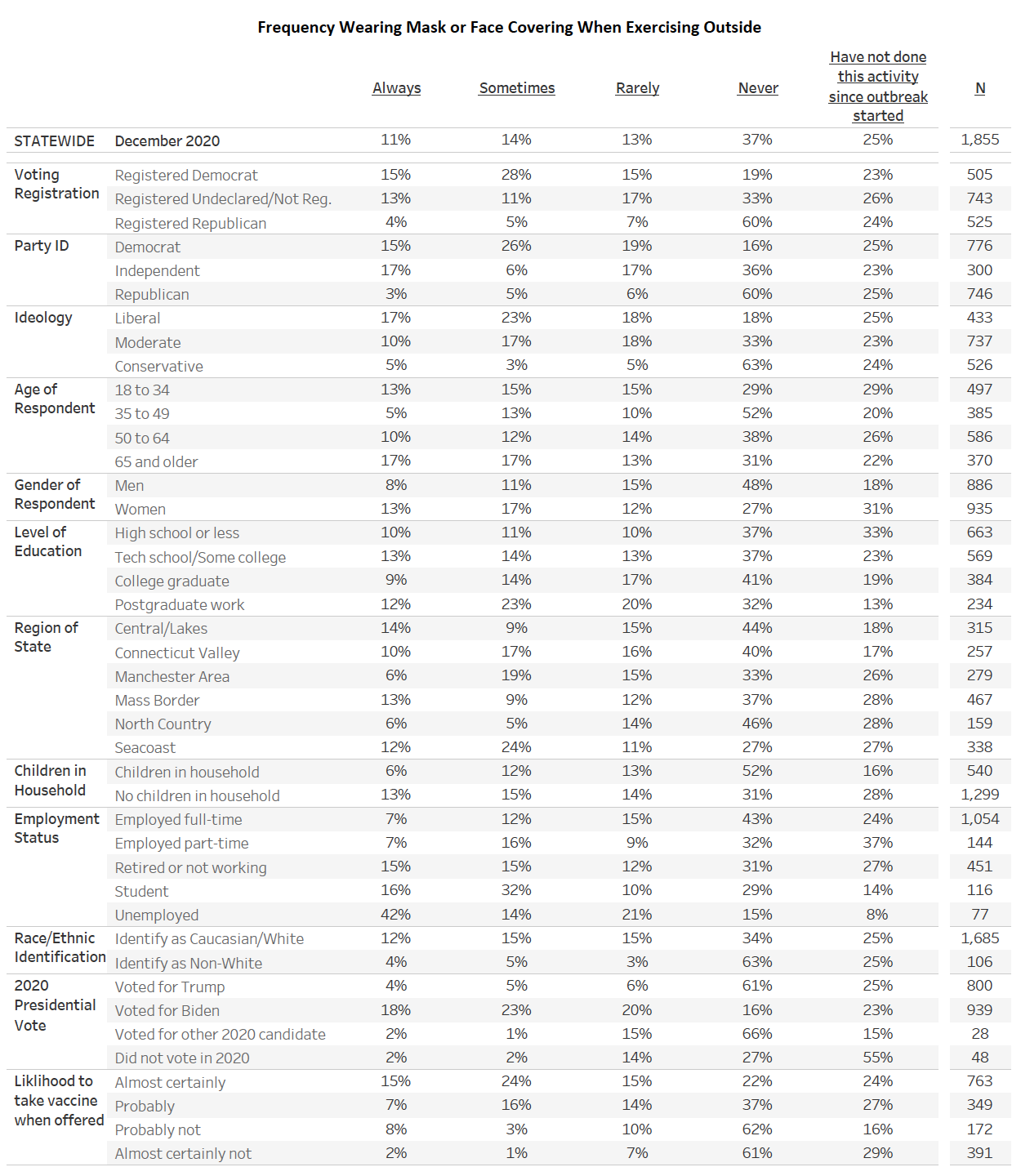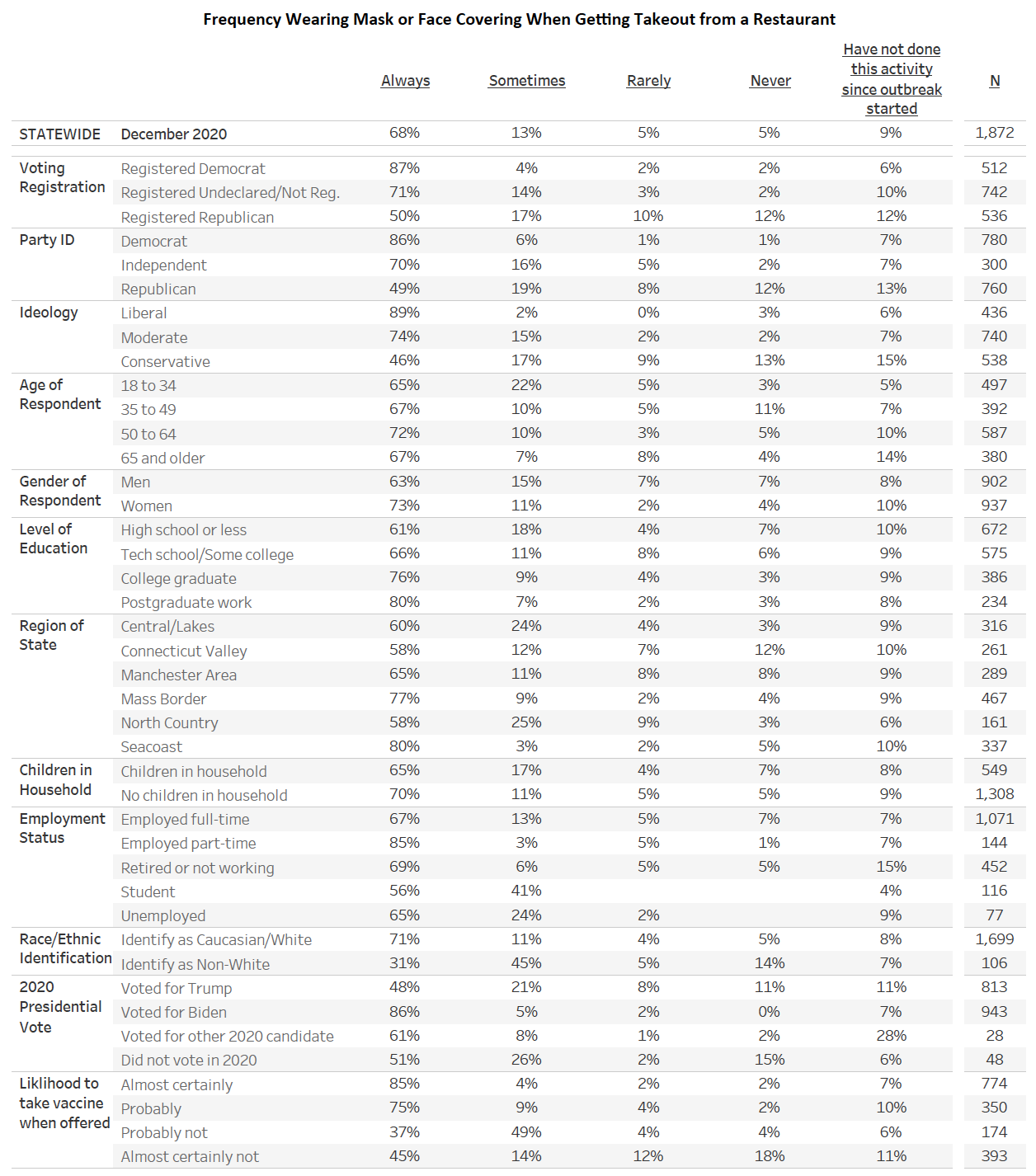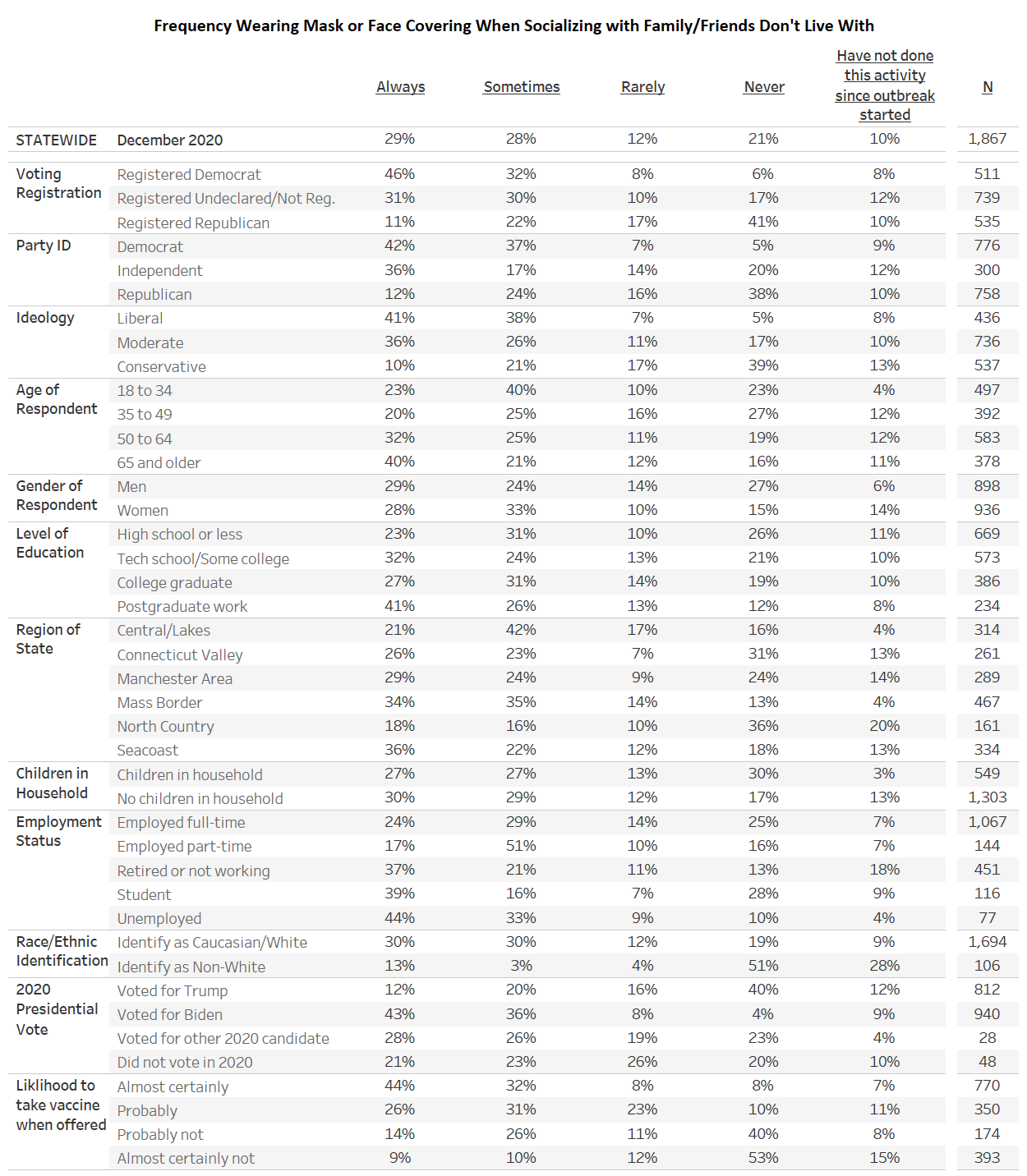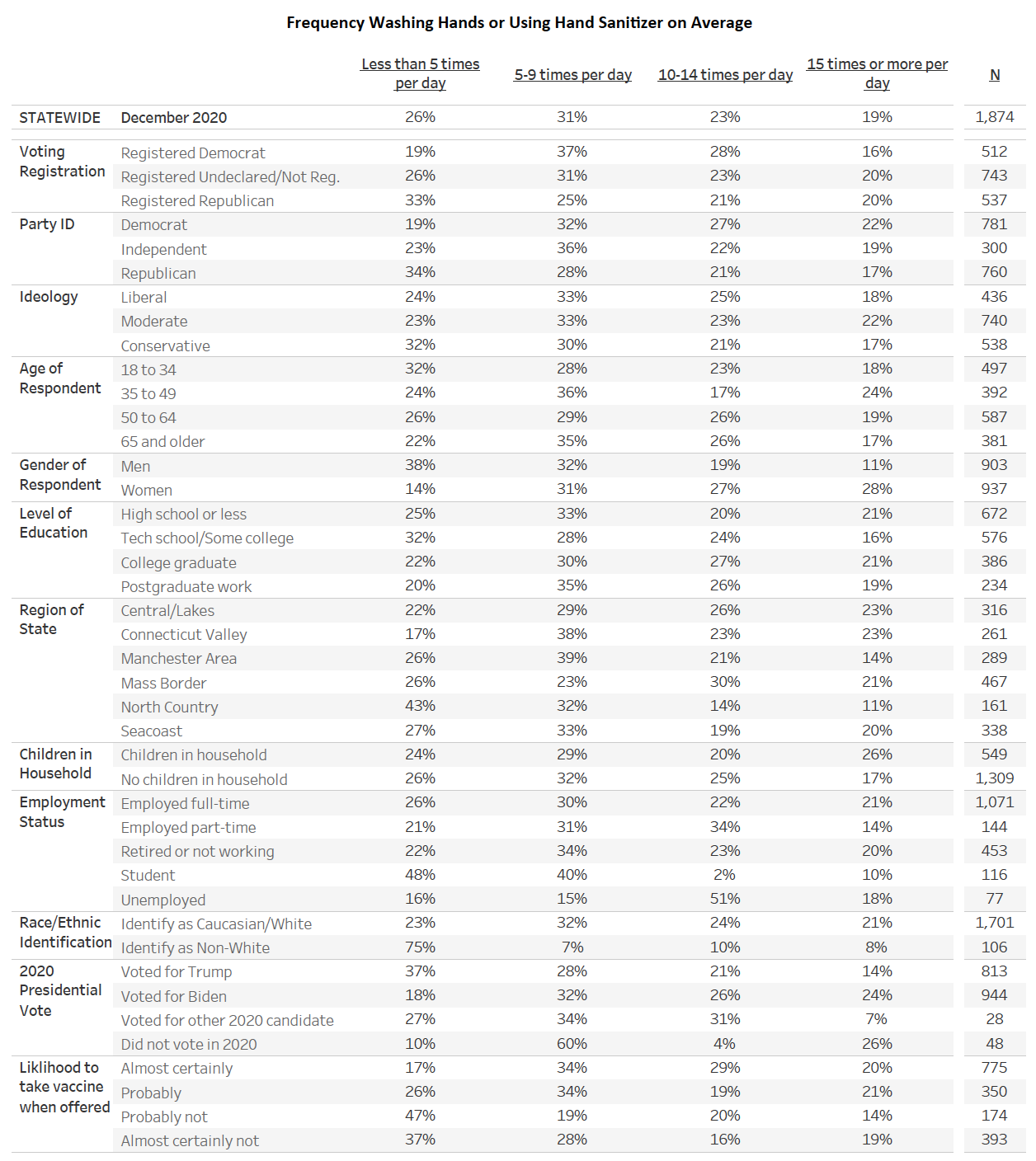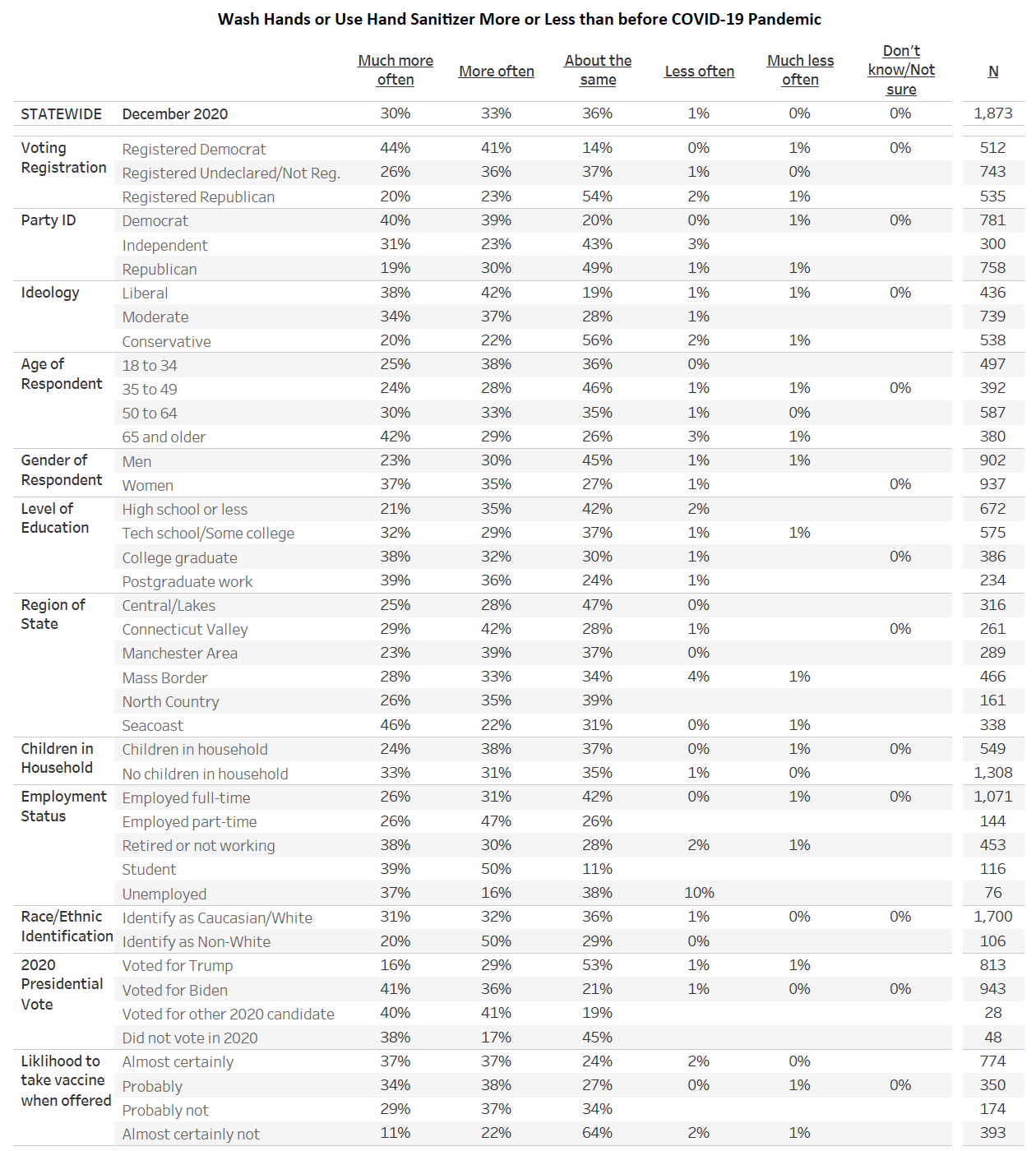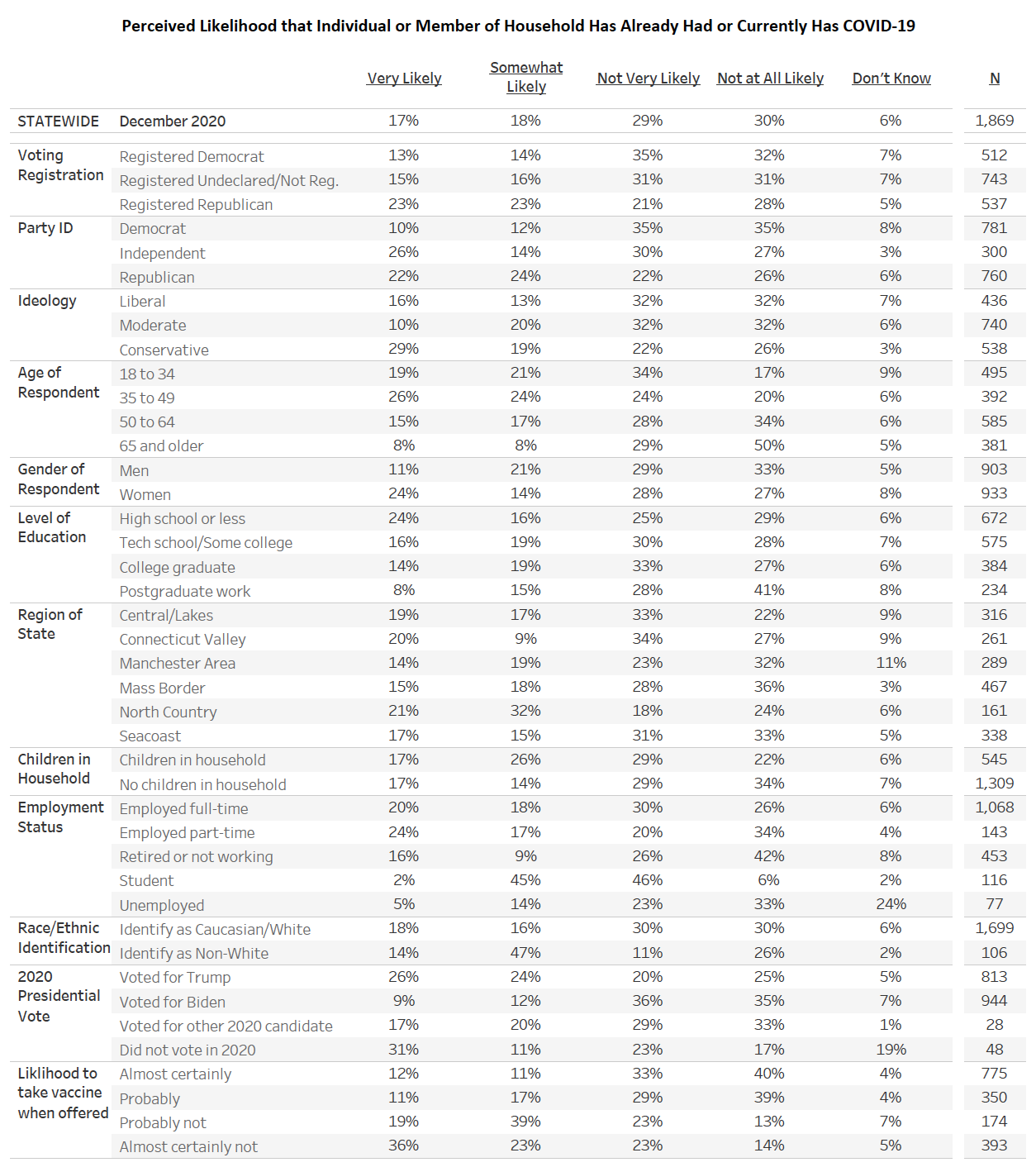
ANXIETY & COVID-19 STRESS FALL IN NH BUT DEPRESSION ON THE RISE; STARK PARTISAN DIFFERENCES IN REACTIONS TO PANDEMIC
Prepared by:
| Sean P. Mckinley, M.A. | Tracy E. Kerins, Ph.D. |
| Zachary S. Azem, M.A. | Judy Rees, B.M., B.Ch, M.P.H., Ph.D. |
| Andrew E. Smith, Ph.D. |
Durham, NH - Stress related to COVID-19 and general anxiety have fallen among New Hampshire residents since earlier in the fall but symptoms of depression have increased. Most Granite Staters are avoiding large and enclosed gatherings and reported mask usage is higher than in the early summer. More than one-third of residents believe they or a household member have already had or currently has COVID-19. Republicans report less stress about COVID-19, are less likely to be avoiding large and enclosed gatherings, and are more likely to believe someone in their household has or already had had COVID-19 than Democrats.
These findings are based on the latest Granite State Poll*, conducted by the University of New Hampshire Survey Center. One thousand eight hundred and seventy-four (1,874) Granite State Panel members completed the survey online between December 3 and December 7, 2020. The margin of sampling error for the survey is +/-2.3 percent. Data were weighted by respondent sex, age, education, and region of the state to targets from the most recent American Community Survey (ACS) conducted by the U.S. Census Bureau, as well as party registration levels provided by the NH Secretary of State and 2020 election results in NH. Granite State Panel members are recruited from randomly-selected landline and cell phone numbers across New Hampshire and surveys are sent periodically to panel members.
Mental Health
Despite a sharp rise in cases across the country and in the state, New Hampshire residents are less stressed about the COVID-19 pandemic than they were in November, just after the election: only 30% place themselves at 7, 8, 9, or 10 when asked to place themselves on a 0-10 scale rating their overall level of stress as a result of COVID-19, down from 53% in November. Thirty percent report moderate stress, reporting a 4, 5, or 6 on a 0-10 scale, and 40% report low stress, reporting 0, 1, 2, or 3.
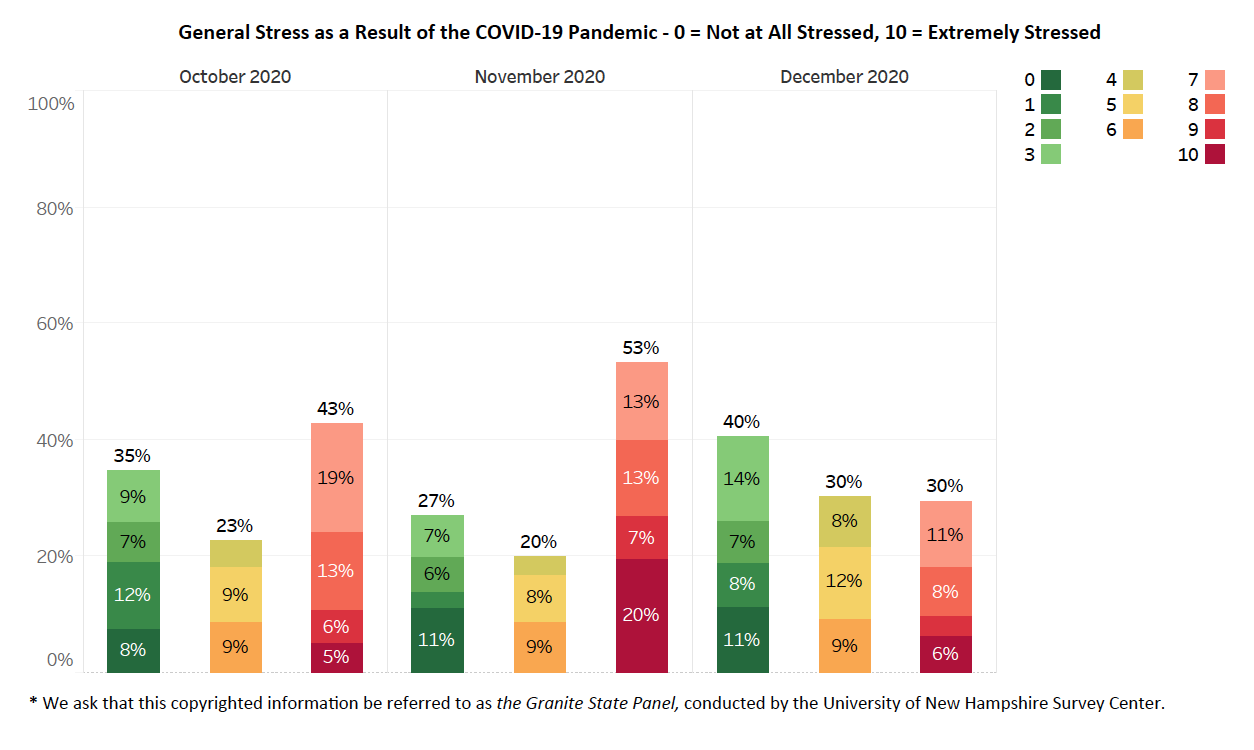
- Democrats (-38 percentage points) are far less likely than in November to say they are highly stressed as a result of COVID-19, while Independents (-15) and Republications (-13) have seen smaller declines since November in the percentage who say they are highly stressed.
- Respondents of all ages are less likely than in November to be highly stressed as a result of COVID-19; those aged 65 and older (-36) and those aged 50 to 63 (-23) are particularly less likely than in November to be highly stressed.
- Men (-23) and women (-24) are both less likely than in November to be highly stressed as a result of COVID-19. Women (38%) remain more likely than men (21%) to be highly stressed due to COVID-19.
- Respondents of all education levels are less likely than in November to say they are highly stressed as a result of COVID-19. Those who have completed postgraduate work (-35) and college graduates (-28) are particularly less likely than in November to be highly stressed.
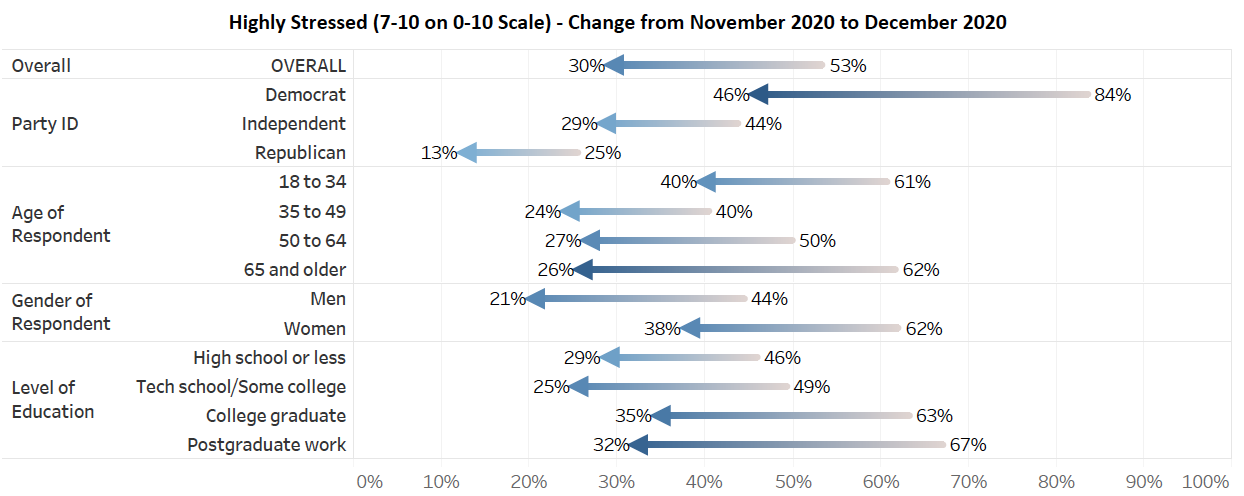
Respondents were asked how frequently they have experienced several mental health symptoms over the past two weeks. Twenty percent of New Hampshire residents say they have been bothered by feeling nervous, anxious, or on edge nearly every day (12%) or more than half the days (9%) in the past two weeks; 30% have felt this way for several days and 50% have experienced this rarely or not at all. Twenty-two percent of residents say they have been bothered by having little interest or pleasure in doing things nearly every day (11%) or more than half the days (11%) in the past two weeks; 23% have felt this way for several days and 54% have experienced this rarely or not at all.
Sixteen percent of residents say they have been bothered by not being able to control or stop worrying nearly every day (10%) or more than half the days (6%) in the past two weeks; 24% have felt this way for several days and 60% have experienced this rarely or not at all. Nineteen percent of residents say they have felt down, depressed, or hopeless nearly every day (10%) or more than half the days (9%) in the past two weeks; 24% have felt this way for several days and 57% have experienced this rarely or not at all.
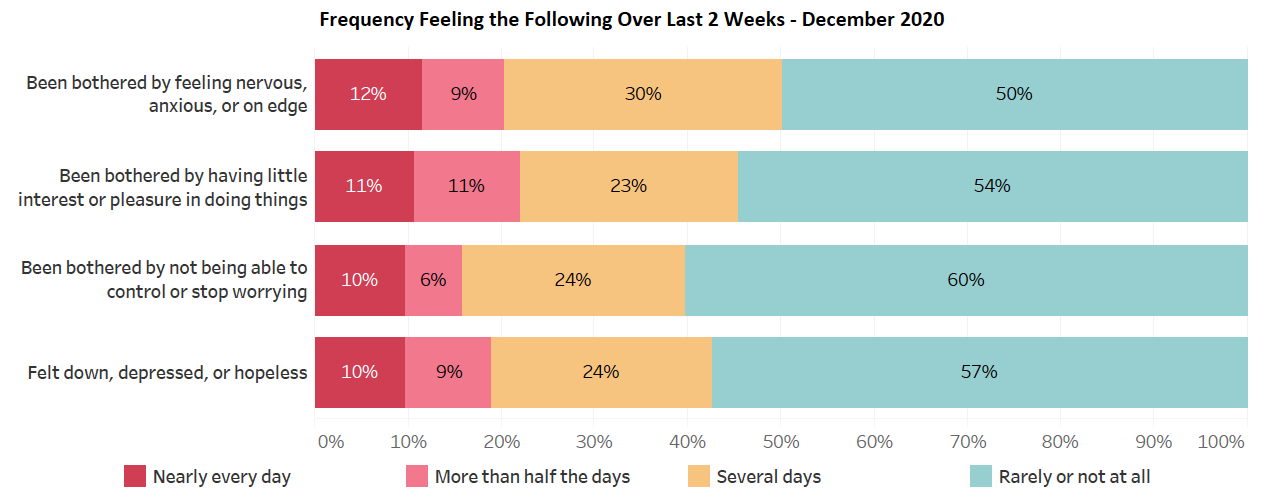
Applying a standard formula based on these responses to screen for generalized anxiety and depressed mood*, 19% of New Hampshire residents meet the threshold for identifying possible cases of generalized anxiety disorder, down from 23% in October, and 24% meet the threshold for depression, up from 17% in October. For comparison, past-year estimates for the prevalence of generalized anxiety and depression at the national level are 3% and 7% respectively.**
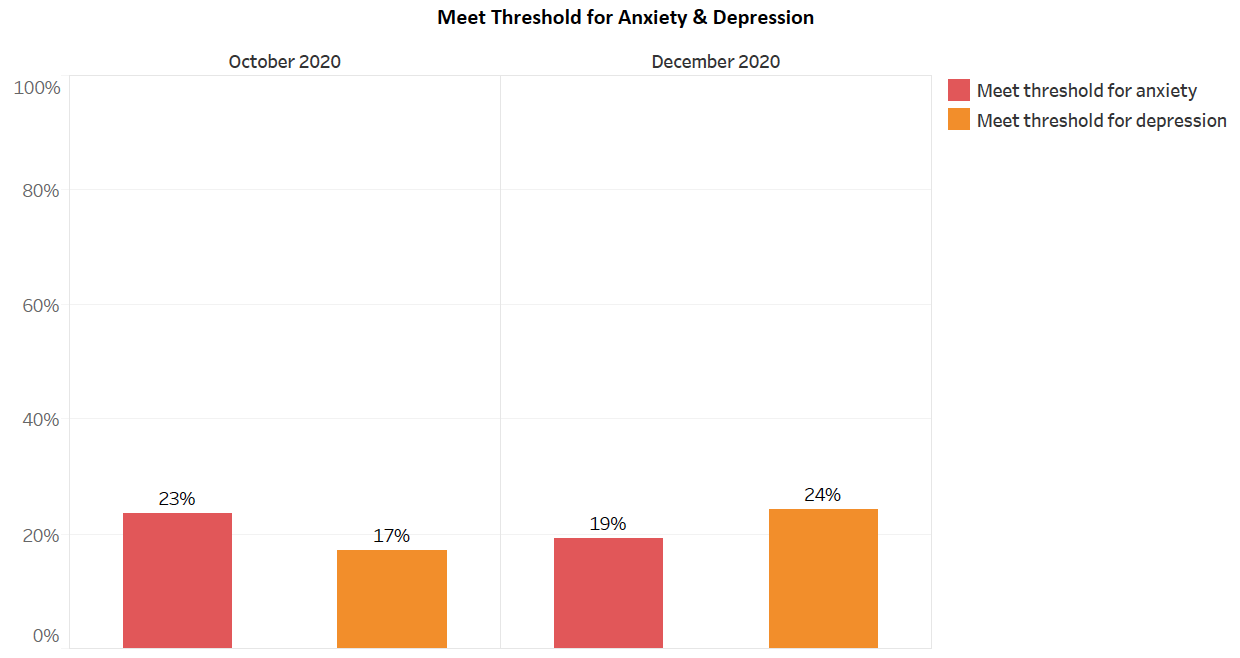
New Hampshire residents are slightly less likely than in October (-4 percentage points) to meet the threshold for identifying possible cases of generalized anxiety disorder. Self-identified Democrats (-16 percentage points), those aged 18 to 34 (-16), college graduates (-14), and those who have completed postgraduate work (-11) have seen the largest declines in anxiety since October while Independents (+10) have seen the largest increase in anxiety since that time.
Despite anxiety declining slightly since October, Granite Staters are slightly more likely than in October (+7 percentage points) to meet the threshold for identifying possible cases of depression. Independents (+13), Republicans (+13), those aged 35 to 49 (+10) and 50 to 64 (+14), women (+11), and those with a high school education or less (+18) have seen the largest increases in depression since October.
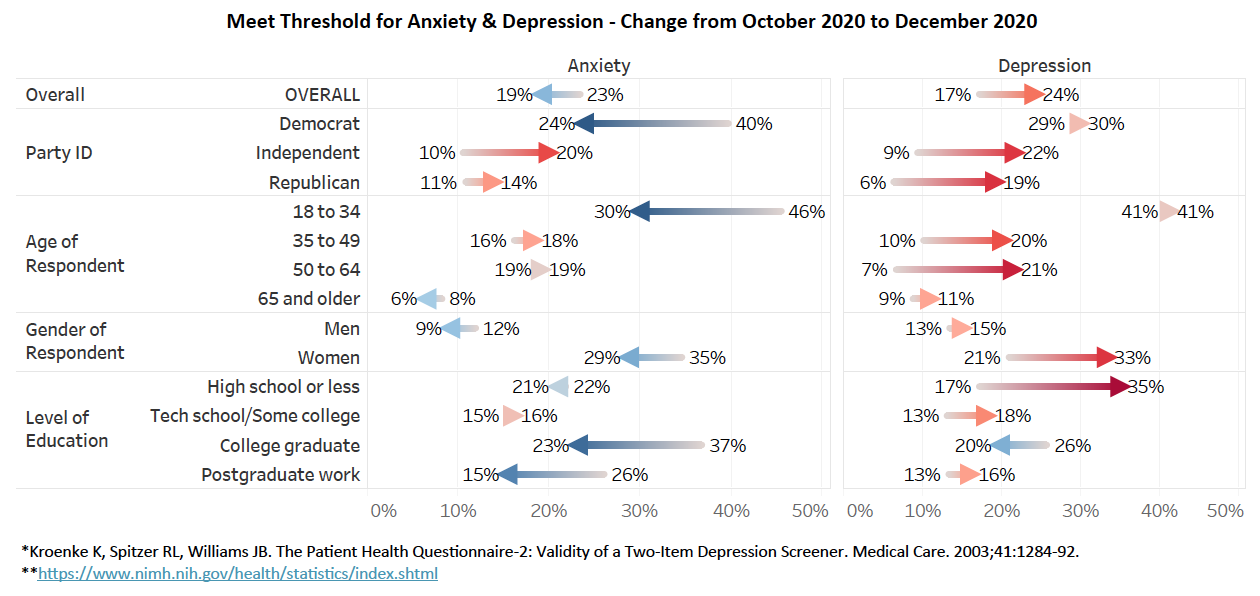
Social Distancing
Most New Hampshire residents are practicing social distancing. Nearly two-thirds of Granite Staters (65%) say that in the past seven days, no one in their household spent time in an indoor area where ten or more people were closely gathered. Ten percent say someone in the household did this once in the past seven days, 7% did so twice, 2% did so three times, 2% did so four times, 5% did so five times, 2% did so six times, 4% did so seven times in the past seven days, and 2% can't remember. Very few respondents say that someone in their household spent time in an indoor area where fifty or more people were closely gathered; 91% say no one in their household did this in the past seven days.
One in six (16%) residents say that someone in their household at least once in the past seven days spent time in an outdoor area where ten or more people were closely gathered but very few (2%) say that anyone in their household spent time in an outdoor area where fifty or more people were closely gathered.
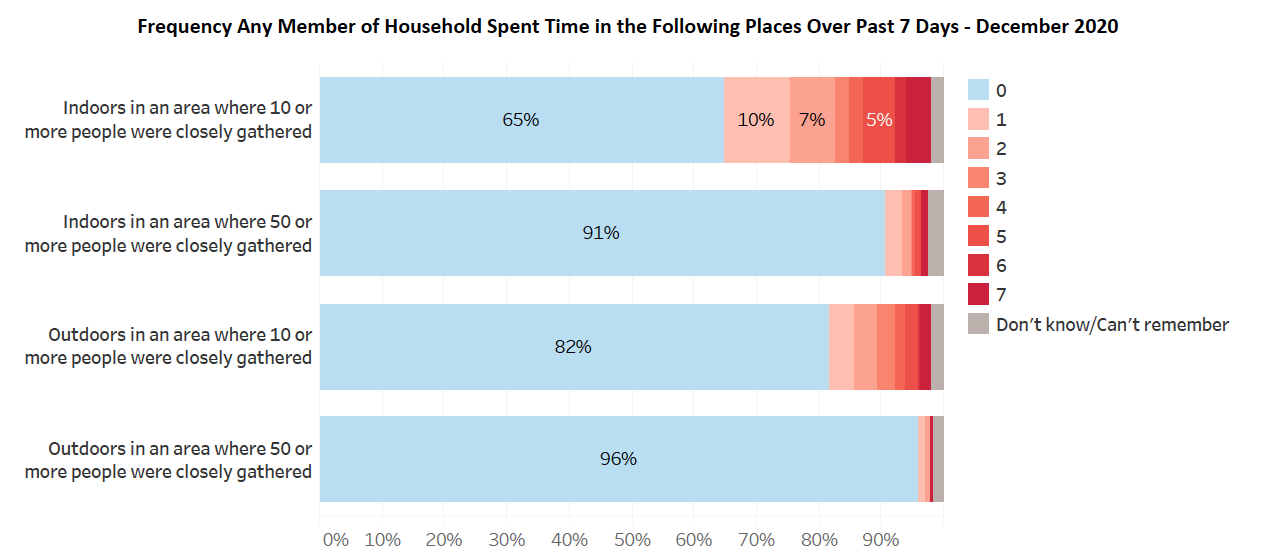
Students, those who say they will probably not take the COVID-19 vaccine when it is offered to them, those with a household income between $45,000 and $99,000, North Country Residents, those with children in their household, and those aged 18 to 34 are more likely than others to say that someone in their household at least once in the past seven days spent time in an indoor area where 10 or more people were closely gathered. Those who are retired or not working, those with a household income of $150,000 or more, self-described liberals, those aged 65 and older, and Connecticut Valley residents are less likely to say anyone in their household did this in the past seven days.
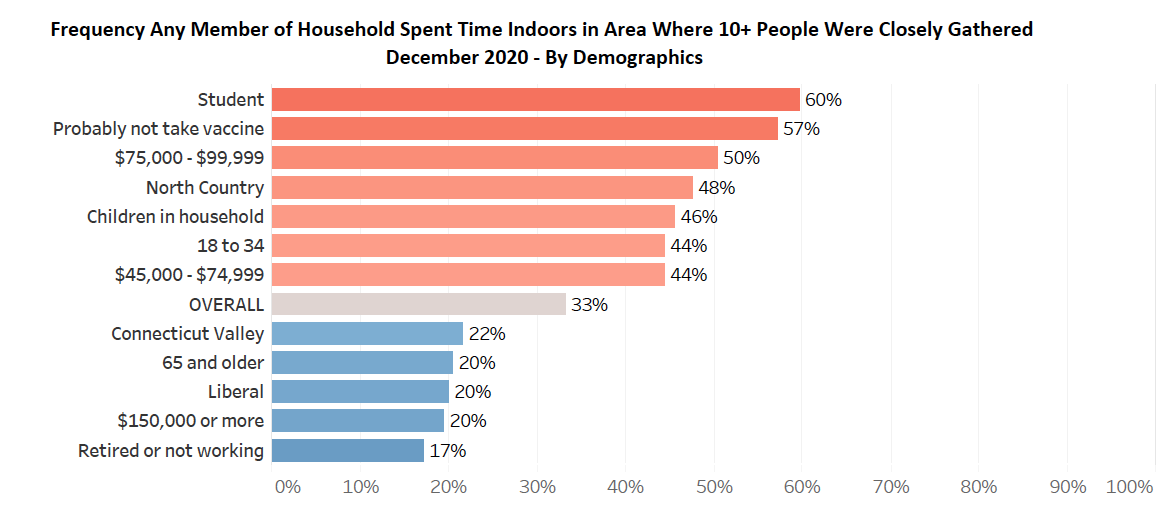
Governor Chris Sununu issued a mandate that beginning on November 20, New Hampshire residents must wear a mask or face covering when in public spaces where they are unable to maintain a physical distance of six feet. Granite Staters report wearing masks more frequently than they did in the spring and early summer. Nine in ten (89%), say they always wear a mask or face covering while shopping at a grocery store or pharmacy, up from 72% in June, while only 1% say they never do this, down from 12% in June. Three-quarters (75) always wear a mask or face covering when getting takeout from a restaurant, up from 58% in June. Relatively few continue to wear a mask or face covering when socializing with family or friends they don't live with or when exercising outside. Thirty-two percent always wear a mask or face covering while socializing, up from 19% in June, and 14% always wear one when exercising outside, up from 7% in June.
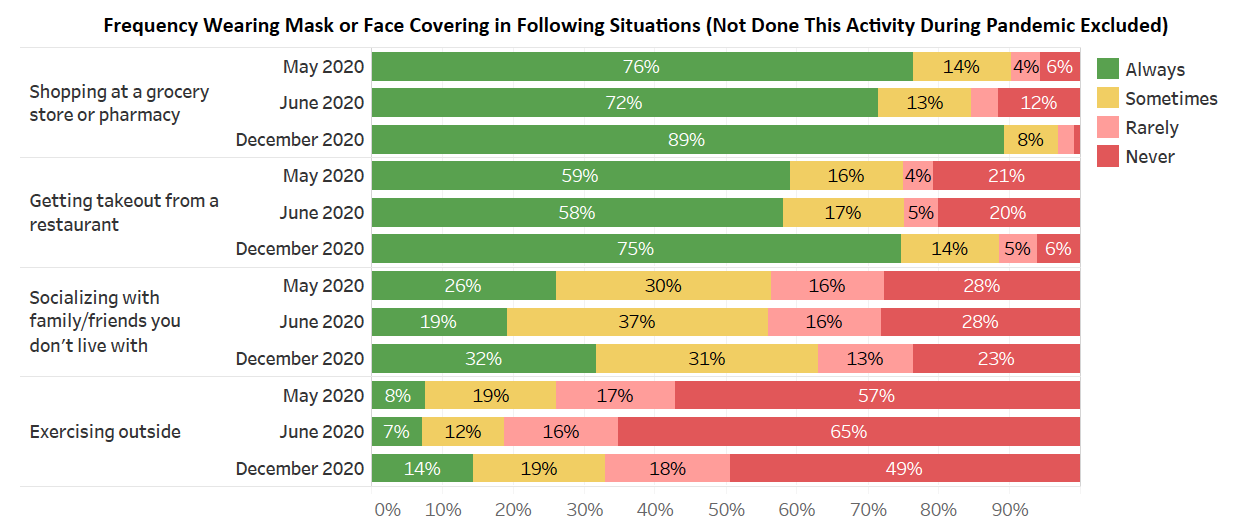
- Even in situations in which Governor Sununu's mandate is often not applicable, such as when socializing with family or friends you don't live with, Granite Staters are more likely than in June (+12 percentage points) to say that they always wear a mask.
- Democrats (+16) and INdependents (+20) are a good deal more likely than in June to say they always wear a mask when socializing with family or friends they don't live with.
- Respondents aged 18 to 34 are a good deal more likely (+17) than in June to say they always wear a mask when socializing with family or friends they don't live with. Those aged 50 to 64 (+13) or 65 and older (+14) are also more likely than in June to say they do this, and remain more likely to do so than those under the age of 50.
- Men (+14) and women (+9) are both more likely than in June to say they always wear a mask when socializing with family or friends they don't live with and the two groups are now equally likely to say they always do this.
- Respondents of all education levels are more likely than in June to say they always wear a mask when socializing with family or friends they don't live with. Those who have completed postgraduate work (+16) are particularly likely in June to say they always do this.
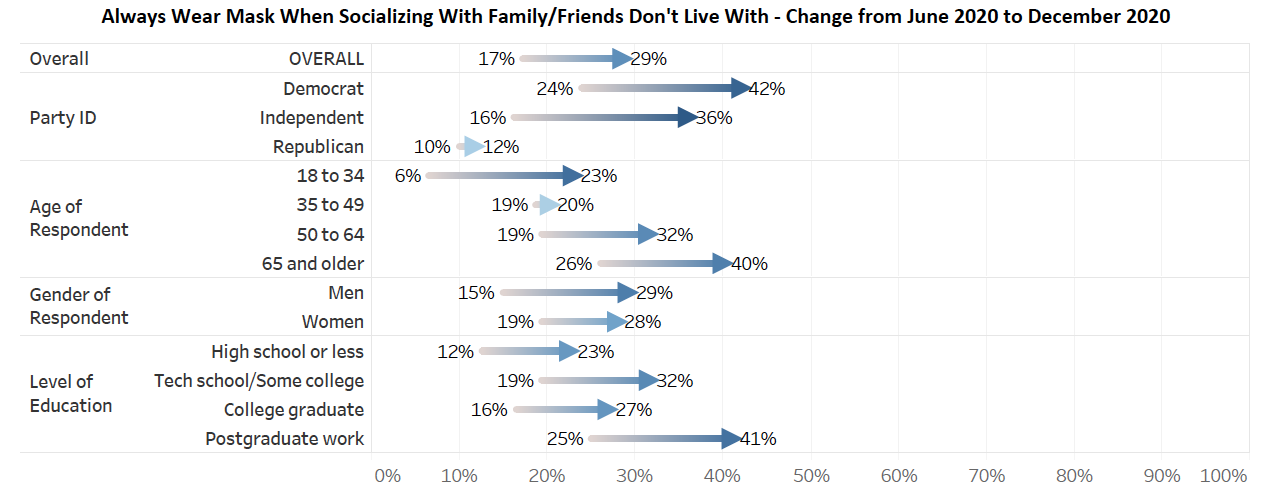
Healthy Practices
Twenty-six percent of New Hampshire residents say that they wash their hands or use hand sanitizer less than five times per day on average, 31% do so 5-9 times per day, 23% do so 10-14 times per day, and 19% do so fifteen times or more per day.

Those who were unemployed and women are more likely than others to say that they wash their hands or use hand sanitizer ten times or more per day on average. Students, North Country residents, and men are less likely to say they wash their hands or use hand sanitizer that frequently.

Nearly two-thirds (63%) of New Hampshire residents say they wash their hands or use hand sanitizer more often (33%) or much more often (30%) than they did before the COVID-19 pandemic. Thirty-six percent say they wash their hands or use hand sanitizer about the same amount as they did before the pandemic, while only 2% say they wash their hands or use hand sanitizer less (1%) or much less often (<1%) than before the pandemic.

Students, self-described liberals, self-identified Democrats, those who voted for Joe Biden in 2020, those who have completed postgraduate work, and those who will almost certainly take a COVID-19 vaccine when offered are more likely than others to say they wash their hands or use hand sanitizer much more or more often than they did before the pandemic. Those who will almost certainly not take a COVID-19 vaccine when offered, self-described conservatives, those who voted for Donald Trump in 2020, and self-identified Republicans are less likely to say so.
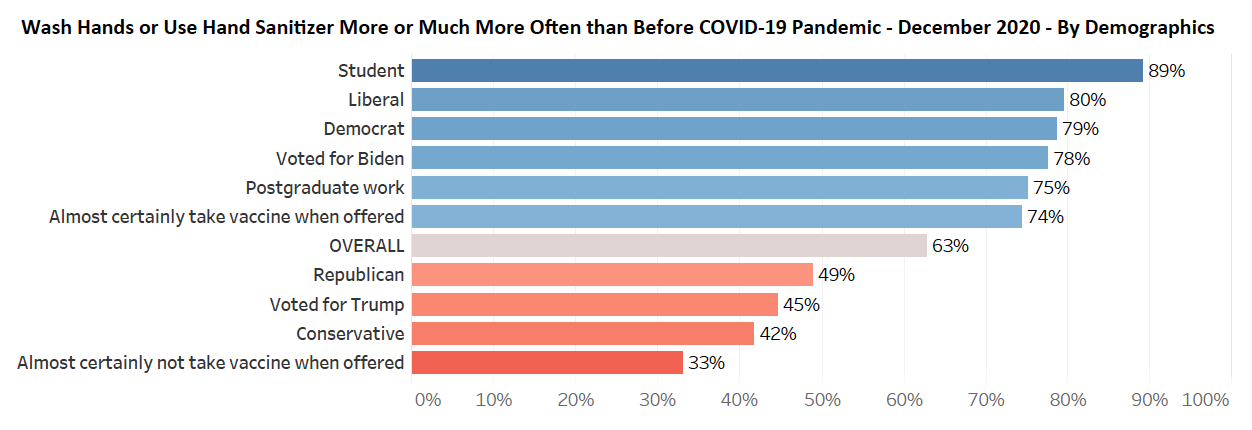
More than a third (35%) of New Hampshire residents believe it is very (17%) or somewhat (18%) likely that they or a member of their household has already had or currently has COVID-19; 59% believe this is not very likely (29%) or not at all (30%) likely, and 6% don't know.
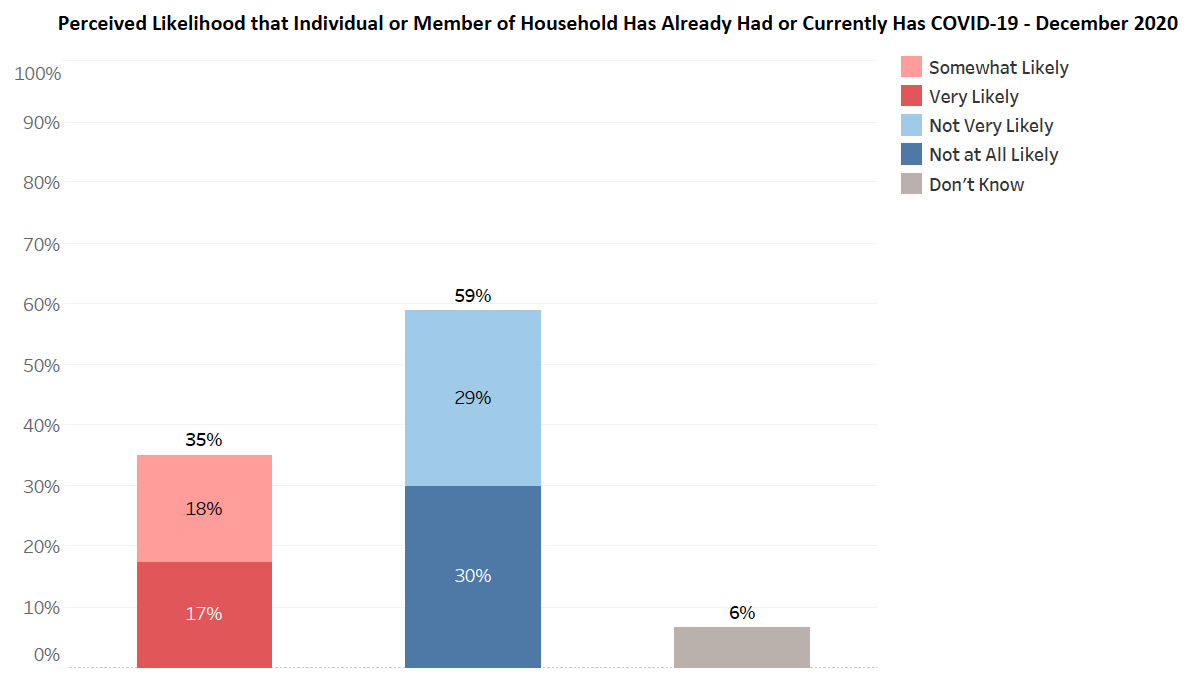
Those who will almost certainly not or probably will not take a COVID-19 vaccine when offered, North Country residents, those who voted for Donald Trump in 2020, those aged 35 to 49, self-described conservatives, students, self-identified Republicans, and those with a household income below $45,000 are more likely than others to believe it is very or somewhat likely that themselves or a member of their household has already had or currently has COVID-19. Those aged 65 and older, those who are unemployed, those who voted for Joe Biden in 2020, self-identified Democrats, those who have completed postgraduate work, those who will almost certainly take a COVID-19 vaccine when offered, and those who are retired or not working are less likely to believe this is true.
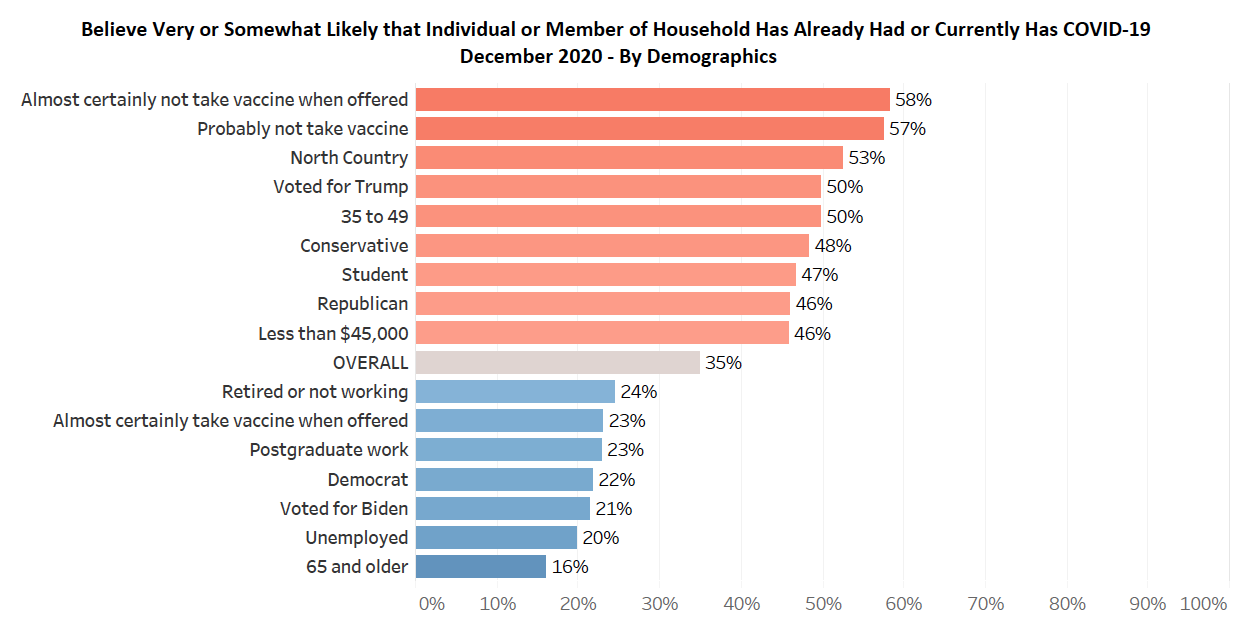
Granite State Poll Methodology
These findings are based on the latest Granite State Poll, conducted by the University of New Hampshire Survey Center. One thousand eight hundred and seventy-four (1,874) Granite State Panel members completed the survey online between December 3 and December 7, 2020. The margin of sampling error for this survey is +/- 2.3 percent. These MSE's have not been adjusted for design effect. The response rate for this survey is 36%. The design effect for the survey is 2.5%.
Data were weighted by respondent sex, age, education, and region of the state to targets from the most recent American Community Survey (ACS) conducted by the U.S. Census Bureau, as well as party registration levels provided by the NH Secretary of State and to 2020 election results in New Hampshire.
The Granite State Panel is part of an effort by the University of New Hampshire Survey Center to investigate new ways of gathering and understanding the opinion of New Hampshire residents. Approximately 5,750 New Hampshire adults were recruited from randomly selected landline and cell phone numbers to participate in the panel. Panelists are then asked to participate in online surveys sponsored by the UNH Survey Center.
The number of respondents in each demographic below may not equal the number reported in cross-tabulation tables as some respondents choose not to answer some questions. Due to rounding, percentages may not sum to 100%.
For more information about the methodology used in the Granite State Panel, contact Dr. Andrew Smith at (603) 862-2226 or by email at andrew.smith@unh.edu.
